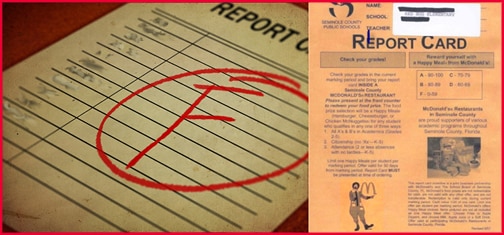 There are a lot of different opinions about how much responsibility the government should take for controlling obesity. When there is agreement that the government should do something, the easiest place to make an impact on large numbers of young and presumably malleable citizens is in the public schools.
There are a lot of different opinions about how much responsibility the government should take for controlling obesity. When there is agreement that the government should do something, the easiest place to make an impact on large numbers of young and presumably malleable citizens is in the public schools.
Canada Free Press offers an interesting perspective on American happenings, and it calls BMI reporting by schools a “feel-good policy” promulgated by “dietary crusaders,” which results in “unintended consequences.” The accuracy of the tests is also questioned, but consider the source. This article is filed under group authorship of the Center for Consumer Freedom, self-described as
…a nonprofit coalition supported by restaurants, food companies, and consumers, working together to promote personal responsibility and protect consumer choices.
The Center for Consumer Freedom expresses its feeling bluntly:
Body Mass Index report cards are the bureaucratic equivalent of a bully’s “kick me” sign on the backs of some children
To support this assertion, they cite research from the University of Buffalo showing that overweight kids eat more and exercise less when they are singled out for attention. And, in general, an argument can be made that school intervention might do more harm than good. But how can we know these things? Fortunately, the nation is a living laboratory. Because some of the rules vary at the local and state levels, various methods can be tried out.
The downside is that a certain number of kids are just going to end up being experimented on, in terms of any revelations about how BMI reporting affects the overall situation. It can’t be helped, and it’s the result of the freedom that sees different rules in different jurisdictions.
The piece mentions Ohio, where an elementary school girl refused to eat dinner after peeking at her BMI report card, which she carried home herself. The problem was blamed on the delivery, not the message. This delivery method allows access by not only the child, but by the child’s friends and the neighborhood bully. The lesson learned was to communicate with the parents some other way, perhaps via the U.S. Postal Service. Whether or not the real issue boils down to confidentiality, a bit of discretion can’t hurt. The article also speaks of Arkansas in 2003, where
Thirteen percent of parents said their kids had been teased at school, and the program achieved absolutely no statewide decrease in childhood obesity.
We have previously covered the news from Liverpool, where the council was thinking about banning the word “obesity” in the schools. That article in The Telegraph attracted a sarcastic comment from a reader known as “aydee,” who said,
Why not introduce a license to breed or raise children that is based upon BMI? Anyone with a thirty plus BMI would be ineligible for child benefits. We now have parents being jailed for their kid’s truancy why not their weight? We could also issue BMI based licenses for fast food. Only those with A BMI below 30 would be permitted to enter restaurant where any food with a calorific value of 800 or more were served. For the undocumented and unlicensed we could add scales and tape measures so that a rough BMI could be calculated. With several hundred restaurants in most cities that could lead to the generation of thousands of new jobs, the taxes from which could pay for the licensing program.
A similarly tongue-in-cheek idea from elsewhere suggested that the BMI report cards could be sponsored by McDonald’s. The important thing is that somebody should be paying a lot of attention to these different experiments, to the ways in which different school districts are handling the difficult challenge of telling parents their children are overweight or obese. If some conclusions can be made, recommendations and best practices can follow, so that no more suffering is inadvertently caused. Are we learning any lessons? Do schools still send BMI report cards home hand-carried by the kids? Exactly how accurate is the reporting?
Your responses and feedback are welcome!
Source: “BMI Report Cards Get Another ‘A’ in Humiliation,” Canada Free Press, 04/03/11
Source: “Council considers banning word ‘obesity’ to avoid offending overweight children,” The Telegraph, 04/12/10
Image by amboo who?, used under its Creative Commons license.
Image by FunnyBiz (Elana Centor), used under its Creative Commons license.

 FAQs and Media Requests:
FAQs and Media Requests: 











